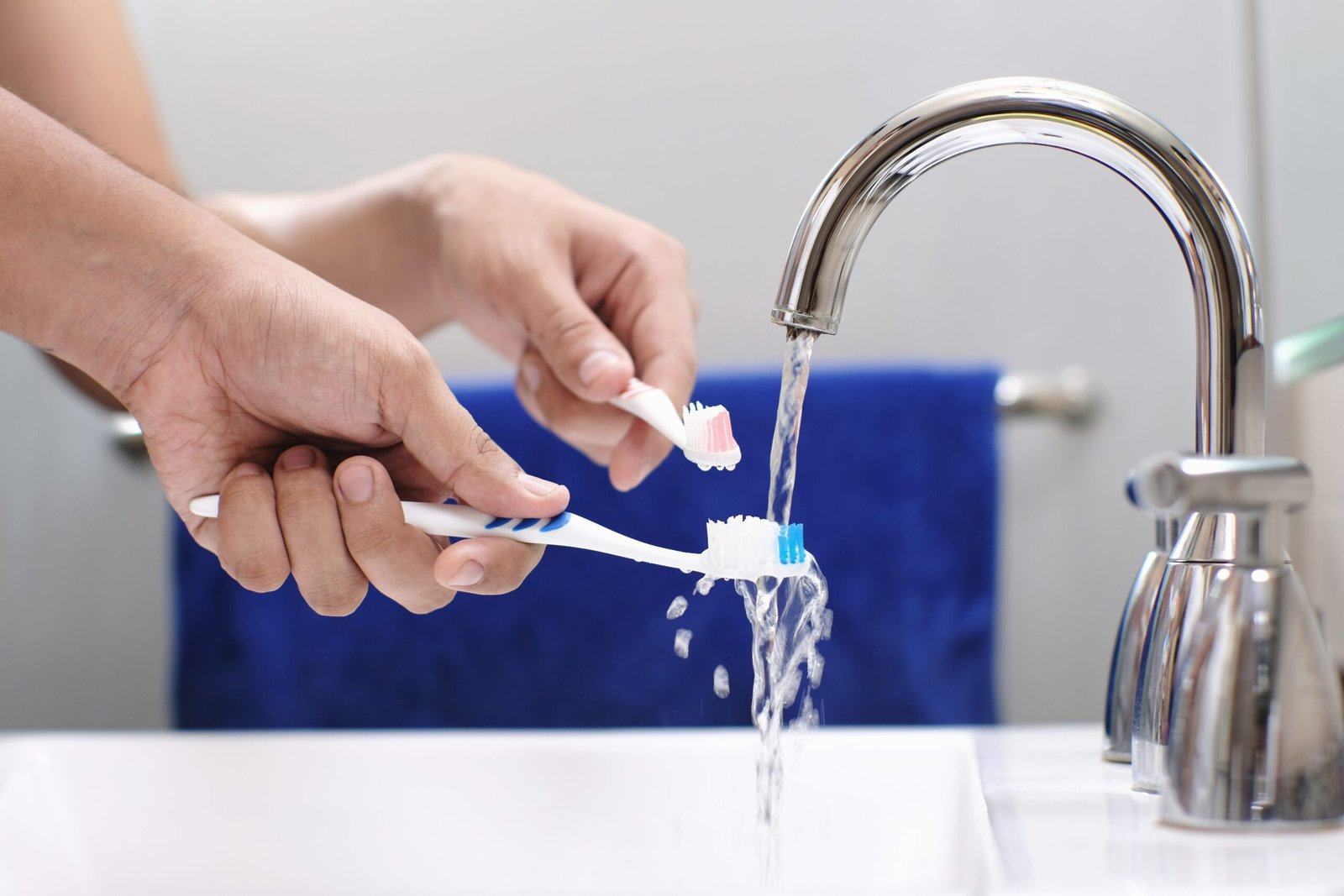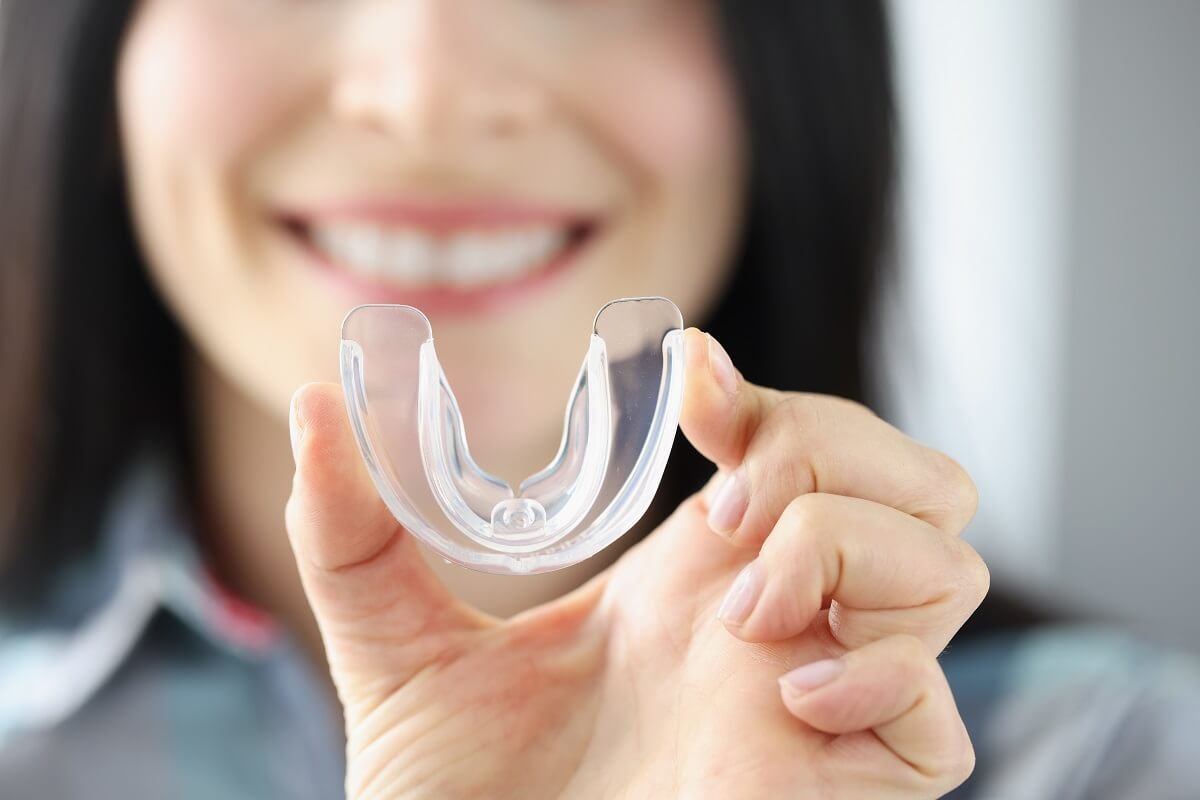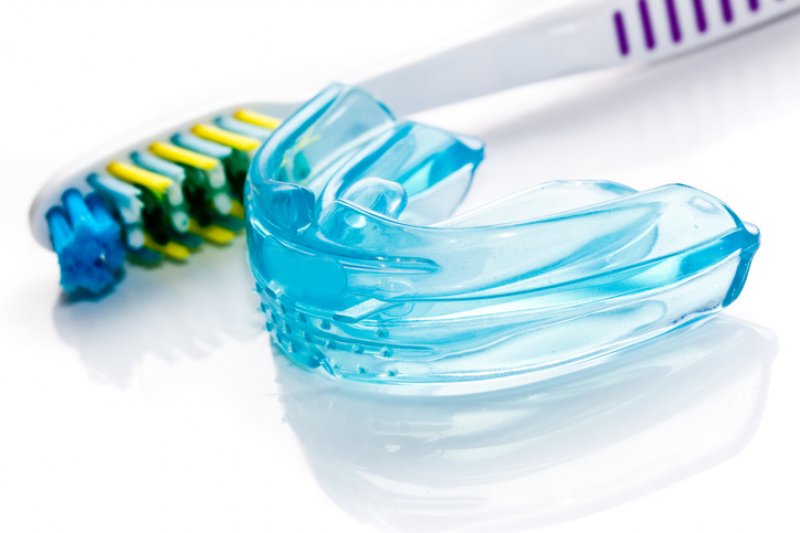Properly cleaning mouth guard is essential for both its longevity and for ensuring optimal oral hygiene. Whether you utilize it for protecting your teeth during rigorous sports or for managing nighttime teeth grinding, overlooking its upkeep can diminish its effectiveness.
This comprehensive guide delves into the importance of mouth guard cleaning and covers various aspects including:
- The importance of cleaning a mouth guard.
- Efficient techniques for cleaning mouth guard.
- Home cleaning tips, such as using soda, toothpaste, soap, hydrogen peroxide, vinegar etc.
- Different mouth guard materials and their implications on cleanliness.
Why should you clean your mouth guard?

Wearing mouthguards, like NTI night guards, can offer relief for issues like teeth grinding. Nonetheless, dental professionals emphasize the importance of regular cleaning to prevent potential oral complications. But what makes cleaning mouth guards so crucial?
Here are the primary reasons why prioritizing the cleaning of your mouth guard is essential:
Maintaining oral hygiene
Enhancing oral hygiene is paramount. The Academy of General Dentistry highlights that mouth guards, being porous, can harbor significant amounts of bacteria, yeasts, and mold, potentially leading to serious infections. Additionally, they serve as ideal environments for bacteria and food particles to accumulate. Without regular cleaning, mouth guards heighten the risk of gum disease and other oral infections. rephrase the sentence to this:
Therefore, developing good oral care habits and understanding proper cleaning techniques is crucial for removing bacterial buildup and debris, thereby safeguarding oral health and promoting dental well-being.
Managing odors
Mouth guards provide an ideal environment for bacteria to thrive, leading to the development of unpleasant odors if not cleaned regularly. This odor results from both bacteria and trapped food particles. Understanding proper cleaning methods allows you to effectively remove these odor-causing agents, ensuring a fresh and enjoyable experience whenever you use your mouth guard.
Prolonged lifespan
Similar to other dental appliances, maintaining a mouth guard properly can substantially increase its lifespan.
Consistent cleaning prevents the accumulation of stains, tartar, and plaque, which may otherwise degrade the mouth guard’s quality over time.
Furthermore, these factors can impact the appearance of the mouth guard, rendering it unusable sooner. However, regular cleaning preserves its longevity, ultimately saving you money that would otherwise be spent on replacements.
Improved functionality

Inadequate maintenance of a mouth guard can compromise its performance. For example, when using a mouth guard for sports, improper maintenance may impede proper breathing, resulting in diminished endurance.
Conversely, with a clean mouth guard, you can fully concentrate on the game without any distractions. This principle also applies to individuals who wear mouth guards while sleeping, as poorly maintained mouth guards can disrupt sleep quality.
Efficient home cleaning methods for mouth guards
Maintaining the cleanliness of your mouth guard to ensure peak oral health and performance doesn’t require complicated procedures. Instead, you can rely on readily accessible household items to accomplish this task.
Here are some straightforward yet efficient methods for cleaning mouth guard:
Using toothpaste
Cleaning mouth guard can be a daily routine similar to brushing your teeth, using a soft-bristled toothbrush and non-abrasive toothpaste. This method ensures a thorough cleanse along with a fresh scent.
Follow these steps when cleaning mouth guard with toothpaste:
- Start by rinsing your mouth guard under cool water.
- Gently scrub all surfaces of the mouth guard using the toothbrush.
- Pay extra attention to any crevices or intricate areas.
- Rinse the mouth guard thoroughly under warm running water after brushing.
- Allow the mouth guard to air dry completely before storing it in its protective case.
To prevent cross-contamination, it’s crucial to use a separate toothbrush for cleaning mouth guard. Additionally, when cleaning children’s mouth guards, it’s advisable to opt for mild toothpaste to ensure safety.
Using soap and water
Dental professionals endorse soap and water as an effective method for cleaning mouth guard, which is not only efficient but also readily accessible.
To clean your mouth guard using soap and water, follow these simple steps:
- Begin by rinsing your mouth guard under cool water.
- Apply a small amount (or a drop) of soap onto the mouth guard.
- Gently brush the mouth guard with a soft-bristled toothbrush until it becomes soapy.
- Rinse thoroughly with warm running water to remove all suds.
- Allow the mouth guard to air dry completely before storing it in its protective case.
Here’s a quick video from Dr. Gary Michaelson to guide you on how to use a toothbrush when cleaning your mouth guard:
Using mouthwash
Mouthwash, renowned for its antimicrobial properties, is an excellent option for cleaning mouth guards.
Here’s the suggested method for using mouthwash to clean your mouth guard:
- Start by rinsing the mouth guard with water.
- Pour a capful of antibacterial mouthwash into a separate container.
- Submerge the mouth guard in the container and let it soak for at least 30 minutes.
- Remove the mouth guard and rinse it thoroughly with water.
- Allow the mouth guard to air dry completely before storing it securely.
To prevent damage, it’s essential to use only alcohol-free mouthwash, and ensure proper dilution as recommended by dental experts.
Using baking soda
Baking soda is a perfect solution for effectively eliminating debris and odors from mouth guards. It’s renowned for its stain-removing properties and ability to neutralize unpleasant smells.
This method is particularly beneficial for mouth guards that have been neglected or have accumulated filth due to inadequate cleaning practices. Additionally, its affordability makes it a convenient option for regular home use.
To rejuvenate your mouth guard, follow these straightforward steps for cleaning it with baking soda:
- Mix equal parts of baking soda and water in a clean bowl to create a paste.
- Dip a soft-bristled toothbrush into the paste and gently brush the mouth guard.
- Once cleaning is complete, rinse the mouth guard thoroughly with cool running water.
- Allow the mouth guard to air dry completely before storing it securely.
Utilizing hydrogen peroxide and vinegar
A combination of hydrogen peroxide and vinegar offers a thorough cleaning for your mouth guard. Both ingredients are natural and typically non-corrosive, minimizing the risk of damage to the mouth guard.
When using hydrogen peroxide and vinegar, it’s essential to apply them separately without mixing. The process involves soaking the mouth guard first in vinegar, followed by a repeat soak in hydrogen peroxide.
While this method may not be required as frequently as using toothpaste or soap, it’s particularly beneficial for individuals with braces, as they tend to accumulate more bacteria in their mouths.
Here’s a simple guide on using hydrogen peroxide and vinegar to clean your mouth guard:
- Begin by rinsing the mouth guard under cool water.
- Place the mouth guard in a clean glass container and pour enough vinegar to cover it. Allow it to soak for 30 minutes.
- Remove the mouth guard and rinse it thoroughly with cool water, ensuring to rinse the glass container as well.
- Place the mouth guard back in the glass container and cover it with hydrogen peroxide. Let it soak for another 30 minutes.
- Once the soaking process is complete, remove the mouth guard and rinse it with water.
- Allow the mouth guard to air dry completely before storing it.
Here’s a quick video from SportingSmiles on how to use hydrogen peroxide and vinegar to clean your mouth guard:
Water rinse
After each use, rinsing your mouth guard with clean water proves to be a convenient and swift approach to maintaining its cleanliness. Whether you utilize your mouth guard multiple times throughout the day or at intervals, it remains crucial to rinse it with water promptly upon removal from your mouth.
Is it safe to clean my mouth guard using chemicals?
Utilizing chemical-based cleaners for your mouth guard is permissible as long as they are specifically formulated and approved for such use. For example, non-abrasive denture cleaners available over-the-counter (OTC) are suitable options for maintaining mouth guards.
While some mouth guards, such as those from reputable brands like Pro Teeth Guard, exhibit considerable durability, it’s crucial to avoid harsh and alcohol-based products that could potentially harm the material. Additionally, such cleaners might carry health hazards, underscoring the importance of adhering to mild cleaning solutions endorsed by dental professionals.
Moreover, many OTC denture cleaners contain synthetic scents and dyes. If you harbor concerns regarding these additives, exploring more natural alternatives is advisable.
How often should you clean your mouth guard?
There are three distinct occasions when cleaning mouth guard becomes necessary, each requiring a specific cleaning method.
Firstly, it’s crucial to clean your mouth guard after each use to eliminate saliva, debris, and food particles. Simply rinsing it with plain water suffices in this instance.
Secondly, it’s advisable to clean your mouth guard at least once daily using toothpaste or soap. This routine effectively removes lingering bacteria and helps combat any unpleasant odors.
Lastly, conducting a thorough cleaning for your mouth guard on a weekly basis is essential to eradicate bacteria and prevent plaque buildup. This can be achieved by soaking the mouth guard in a denture cleaner, mouthwash, or a solution of vinegar and hydrogen peroxide.
Does the material of the mouth guard make a difference?
Mouth guards commonly utilize materials like silicone or plastic, with variations such as EVA and Acrylic also prevalent. These materials offer a blend of durability and softness, ensuring both effectiveness and comfort for wearers. For instance, the best TMJ mouth guards are known for their soft yet highly effective design.
But does the choice of material impact the cleaning process?
In reality, the material of the mouth guard does not significantly influence cleaning. All types of cleaning methods can be safely applied to mouth guards regardless of their material, provided that proper instructions are followed.
However, it’s advisable to exercise caution with thermoplastic mouth guards, as they may deform when exposed to hot water during cleaning.
Conclusion
Proper maintenance of your mouth guard is essential for ensuring its longevity and effectiveness in safeguarding your oral health. By following the guidelines outlined in this comprehensive guide, you can effectively clean your mouth guard using various methods tailored to your needs and preferences. Regular cleaning after each use, along with daily and weekly deep cleans, helps eliminate bacteria, prevent plaque buildup, and preserve the quality of your mouth guard. Additionally, it’s important to use cleaning products that are safe for your mouth guard material and to exercise caution with thermoplastic mouth guards when exposed to hot water. By prioritizing mouth guard hygiene, you can enjoy optimal oral health and prolong the lifespan of your protective device.
FAQ
What happens if you don’t wash your mouth guard?
If you don’t wash your mouth guard regularly, harmful bacteria can accumulate on its surface. This can lead to bad breath, tooth decay, gum disease, and potential infections. Failing to clean your mouth guard can also result in a foul odor, deteriorated material, and reduced effectiveness in providing protection.
Does mouthwash disinfect the mouth guard?
Some mouthwashes can help disinfect a mouth guard to a certain extent due to their antimicrobial properties. However, mouthwash alone may not effectively eliminate all types of bacteria and germs. It is important to combine it with regular brushing and occasional soaking with a cleaning solution.
How often should you wash your night mouth guard?
It is recommended to wash your night guard after every use and at least once a day with toothpaste or soap. A deep clean of the night guard is essential at least once a week with vinegar or a denture cleaner to eliminate plaque and bacteria that may have accumulated over time.
Author of this blog post:
Anye Tchouli Calne Forkob Linkedin

Anye Tchouli Calne Forkob is a medical student at the University of Buea and a Health Sciences student at the University of the People. He is passionate about community health outreach, self-care, and healthy lifestyle and aims to bridge the knowledge gap in the health sector.
Published by Toothhealth Team


